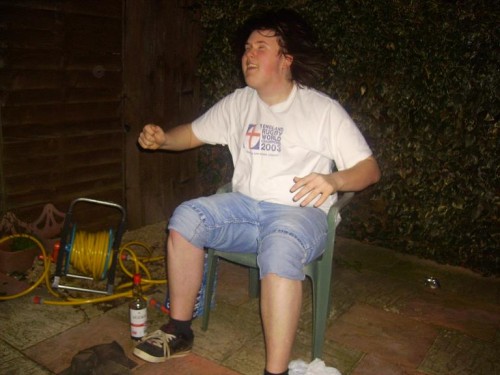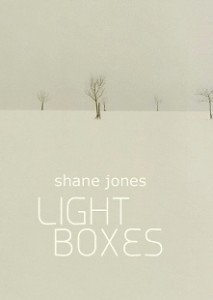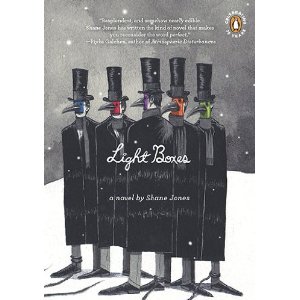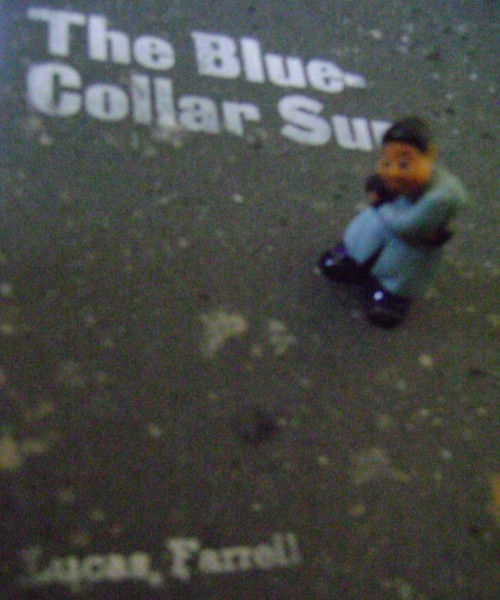sold in america
Yes, I am slightly tri-sheeted. Over-posting. Over-commenting. In the name of Steve Martin, etc. I say, “Excuuuuuuuuuuuuuuseeeeeeeeeeeeeeeeeeeeeeeeeeeeeeeeeeeeeeeeeeeeeeeeeeeeee me.”
And I understand the look on the face of the woman below. Sorry. OK? You went out in a T-shirt…
The semester is over [OK, it is finals week] and I have my rights. And lefts. Also UP and DOWN. Give me 4 chapbooks right now and I’ll buy them, period, as long as it’s painless (no checks or BS Snail Mail–I desire Paypal or you take my credit card). Give me the 4 links now, the chapbooks and I buy them. I’ll review them later, most likely. Or maybe I shoot them or set them afire. But I will read.
Chapbooks only.
They will appear here later, shot or aflame or reviewed. So like you are buying an echo.
I suppose.
MACHETE… MESSAGE TO ARIZONA
httpv://www.youtube.com/watch?v=MKhChMHhBN8
Art v. Politics (2): A Case Study
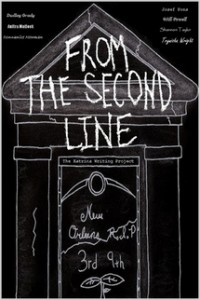 Yesterday, I wrote about my unwavering belief in the power of a serious engagement with the aesthetic to bring us closer to, as Sontag says, “a fuller humanity.” The comments on the post, especially regarding my claim that this is not a privileged position because all humans need beauty (in its most expansive, heart-changing sense), led me to think that I needed to back up the claim a little more.
Yesterday, I wrote about my unwavering belief in the power of a serious engagement with the aesthetic to bring us closer to, as Sontag says, “a fuller humanity.” The comments on the post, especially regarding my claim that this is not a privileged position because all humans need beauty (in its most expansive, heart-changing sense), led me to think that I needed to back up the claim a little more.
Four years ago, brilliant anthropologist Laura Jones and I decided that we wanted to do something to contribute to the recovery of New Orleans, a city dear to both of us.
We secured funding from Rice University to launch the Katrina Writing Project. Then we partnered with a charter school whose students were doing summer internships related to Katrina relief. During the summer, we taught the students to write personal essays about their Katrina experiences, which we then collected, published, and distributed to educators worldwide. You can download the collection here for free.
From this experience originate my beliefs about the vitalness of art in a broken world.
Our students had endured unthinkable tragedy and cruelty.
Dudley Grady’s family was turned away from a hotel only to see a white family check in moments later.
Josef Pons and his family were put on a plane. He writes, “The thing was, we didn’t know we were going to Arizona until we were in the air.”
Donnanice Newman writes, “When I finally got up, I noticed that my family was praying that the rest of our family was safe. I saw a policeman, and I asked him about New Orleans East. The policeman was talking about something that I kinda didn’t understand. But he finally said, “Baby, there ain’t no East.”
The alienation and separation of evacuation caused Anitra Matlock and her girlfriend to break up. Meanwhile, as she writes, “After the storm, random people felt that they needed to tell me why Katrina happened. The most memorable of reasons was that God sent the storm to cleanse the city of its homosexuals and sinners. If ever I needed to cry, it would be when I heard this, and when I saw my home.”
A Conversation with Jean-Philippe Toussaint
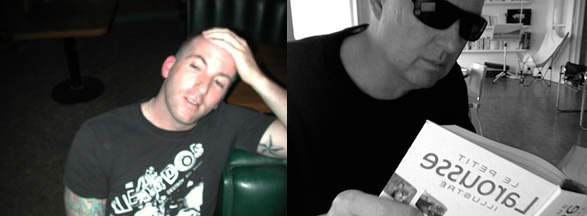
My friend (and yours) Jim Ruland had a chance to speak to Jean-Philippe Toussaint recently, and sent this interview. I was going to run it on Hobart, but the schedule didn’t allow for it to appear in a timely manner there. Instead, we are cross posting it here at HTML Giant and on Hobart’s lovely blog to get the interview as much attention as we can.
Jean-Philippe Toussaint is the author of nine novels. Originally, published in France, the slender books have secured the Belgian author a reputation as a stylist who favors impressions over plot, comic situations over character development. Since 2007, Dalkey Archive Press has been publishing Toussaint’s work in English, trickling out two or three novels a year to a growing audience of eager enthusiasts for the quirky little books.
The most recent novel, Self-Portrait Abroad, released earlier this month, features a Belgian author traveling to cities in Europe and Asia. A sensual train trip to Prague, a visit to a strip joint in Nara, a victory in a lawn bowling tournament in Cap Corse are described in Toussaint’s quintessential style. READ MORE >
Light Boxes Giveaway
To enter to win the original PG version of Light Boxes, together with the new Penguin version, buy a book from an independent press and forward the receipt to lightboxescontest at gmail dot com. If you buy a book from an indie press at a brick and mortar store, scan the receipt or take a good photo of it and email that. Your name will be entered once for every book you buy. Then I will conduct a fair drawing. ENTRIES ARE DUE BY MIDNIGHT MAY 24th. Penguin will officially release their version on May 25, and I’ll do the drawing then.
The Blue-Collar Sun by Lucas Farrell
A man living in a small town in Iowa recently paid two hundred and fifty dollars a book for two books of The Blue-Collar Sun by Lucas Farrell. They were delivered by motortruck from Oregon. He has more ordered.
The Blue-Collar Sun by Lucas Farrell can be bought by the book from alice blue books in almost all of the Seattle or Portland border towns for one thousand cents (approx) a book. Single pages cost fifty cents. There are plenty of words and plenty of purchasers and the price seems to be no deterrent.
It is no wonder that the question that is most often asked of a reader returning to the Midwest from the West Coast is, “How long are they going to be able to ship poetry out of Portland?”
May 5th, 2010 / 2:01 pm
But What About the Nipples? A Nice Conversation (Pt. 3)
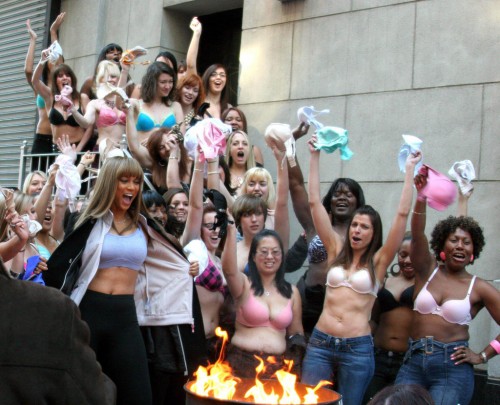
Blake Butler, Kate Zambreno, Amy King and I recently had a nice, interesting, and lengthy conversation about gender, publishing and so much more, prompted by lots of things including the recent, and largely excellent discussion in Blake’s “Language Over Body” post about the second issue of We Are Champion. We thank you all so much for engaging with us on these issues. Part 1 can be found here and Part 2 can be found here.
Amy: I want to try to connect such modes of discussion and modes of writing with why we might have an inequitable publishing history by citing excerpts from Joan Retallack’s essay, “:RE:THINKING:LITERARY:FEMINISM.” Blake, when you say we’re “just people” or we’re “just bodies,” I think you’re resisting the notion that biology is essentialist and destiny (it’s not) that determines how and what we write. You are, in fact, by default arguing against the primary thread of feminist literary tradition that says women’s experiences have traditionally been ignored and must be heard via the writing and, I suspect, you imagine that writers could empathize their way into such positions and write those realities. Just a guess.
But this notion falls short of what types of writing have been deemed masculine and feminine. I hope Kate jumps in soon because she most likely has more to say on this matter than I.
the “cute” avant-garde
 I have this thing against cuteness. Cuteness is dismissable, cast to the side as irrelevant. And I suppose, to be fair, what was the last cute thing you actually took seriously? There seems to be something inherent to cuteness that begs to be cuddled and pet, smooshed and distorted. Taken seriously, though, nah. Nope.
I have this thing against cuteness. Cuteness is dismissable, cast to the side as irrelevant. And I suppose, to be fair, what was the last cute thing you actually took seriously? There seems to be something inherent to cuteness that begs to be cuddled and pet, smooshed and distorted. Taken seriously, though, nah. Nope.


